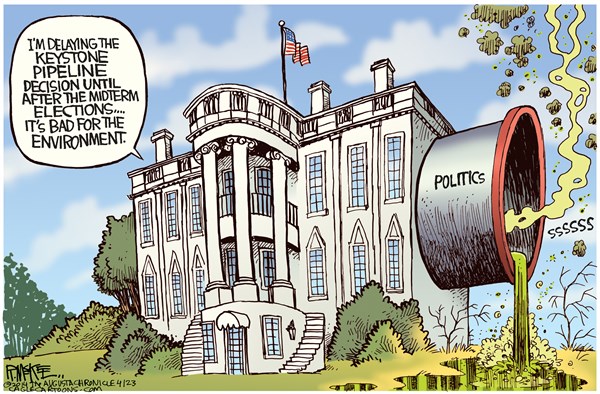
The federal government recently began its seventh year of considering whether to approve construction of the Keystone XL pipeline. Nearly all that time has passed under the administration of President Obama, who seems content never to decide the pipeline's fate. That way, it wouldn't be built, which would please the president's supporters on the liberal environmental fringe, but would never be explicitly rejected, which could offend everybody else.
It's striking to see an administration stonewalling an issue with so much popular support on the other side. A Washington Post-ABC News poll in March found that 65 percent favor building the pipeline, versus 22 who oppose. On how many other issues is the White House standing up against a three-to-one majority of opinion?
Nearly all types of people support building the pipeline. A few months ago, a Pew Research Center study divided the public into seven political categories — not just the usual liberal-conservative binary division. Pew found strong support for the pipeline in six of its seven categories, ranging from mostly conservative to mostly liberal.
For example, among a group labeled "next generation left," that is, young people who are liberal in outlook but skeptical about whether government can accomplish much, there was 62 percent to 28 percent support of the pipeline.
Only the group labeled "solid liberals," the most doctrinaire of those on the Left, opposed the pipeline, 57 percent 30 percent. Although they are passionate about their views, they are in a distinct minority; according to Pew, "solid liberals" make up just 17 percent of all registered voters.
So the Obama administration has solidly aligned itself with the 17 percent against the other 83 percent. Perhaps that's a sustainable position for a president who won't face voters again. It's a tougher job for Democrats running for office in an already tough year.
Last April, 11 Democratic senators wrote a letter to Obama urging approval of the pipeline. Mary Landrieu, facing a tough re-election race in Louisiana, signed the letter. So did Kay Hagan, facing a tough race in North Carolina. And Mark Pryor, facing a tough race in Arkansas. And Mark Begich, facing a tough race in Alaska.
Democrats in other key races support the pipeline, too. Alison Lundergan Grimes, challenging Mitch McConnell for a Senate seat from Kentucky, is one. Michelle Nunn, running for the Senate in Georgia, is another. Nunn has even suggested her party is playing politics with the issue.
"We can produce even more energy and create jobs if we embrace innovation and move beyond partisan bickering," Nunn said in a recent TV ad. "But too many Democrats play politics by dragging their feet on the Keystone Pipeline, while Republicans block renewable energy initiatives that would reduce our long-term dependence on fossil fuels."
That sounds clear, but the story behind Nunn's ad illustrates the Democrats' dilemma when it comes to Keystone. Just this week, Nunn accepted the endorsement of the League of Conservation Voters, a staunch pipeline opponent, and in the past she has attended fundraisers of — and accepted money from — West Coast environmentalists who are implacably opposed to the pipeline. Were Nunn elected, she would face a possibly wrenching conflict between the voters who supported her and the activists who helped fund her campaign.
Elsewhere, pro-Republican outside groups are pounding Democrats on the pipeline issue. Rep. Gary Peters, running for Senate in Michigan, Rep. Bruce Braley, running for Senate in Iowa, Sen. Mark Udall, running for re-election in Colorado — all face ad after ad highlighting their opposition or flip-flops on the pipeline. Most ads connect Democrats with Tom Steyer, the California billionaire determined to stop Keystone.
"Michigan jobs, or a California billionaire?" asks one ad attacking Peters. "We can't leave Michigan's future in Gary Peters' hands."
Events like last weekend's "People's Climate March" in New York are designed to create the appearance of overwhelming support for the environmental agenda. Yes, there was a large crowd walking down Sixth Avenue in Manhattan, but it's a big country. When it comes to the Keystone pipeline, the marchers are a small group isolated in a distant corner of public opinion.
At various times in the last few years, Republicans have felt that Democrats would just have to give in and let the pipeline go forward. It never happened. Now, the president and his allies on the environmental Left seem determined to keep the pipeline stalled even if it contributes to Democrats losing the Senate.
If the prospect of a costly loss, plus the continued opposition of an overwhelming majority of Americans won't open their minds, what will?
Comment by clicking here.



 Contact The Editor
Contact The Editor
 Articles By This Author
Articles By This Author